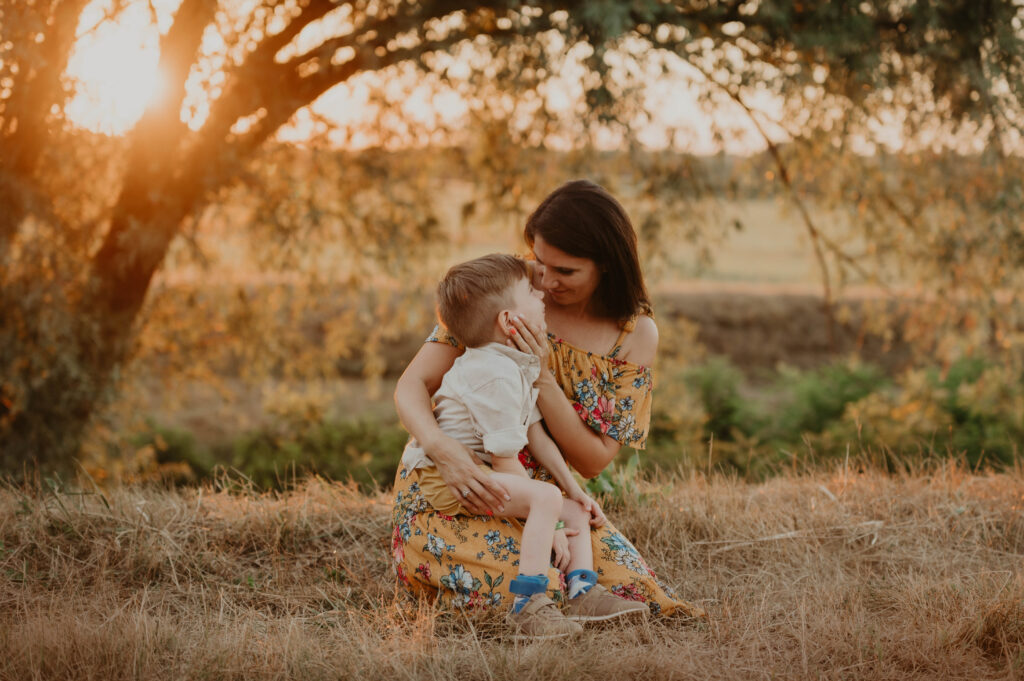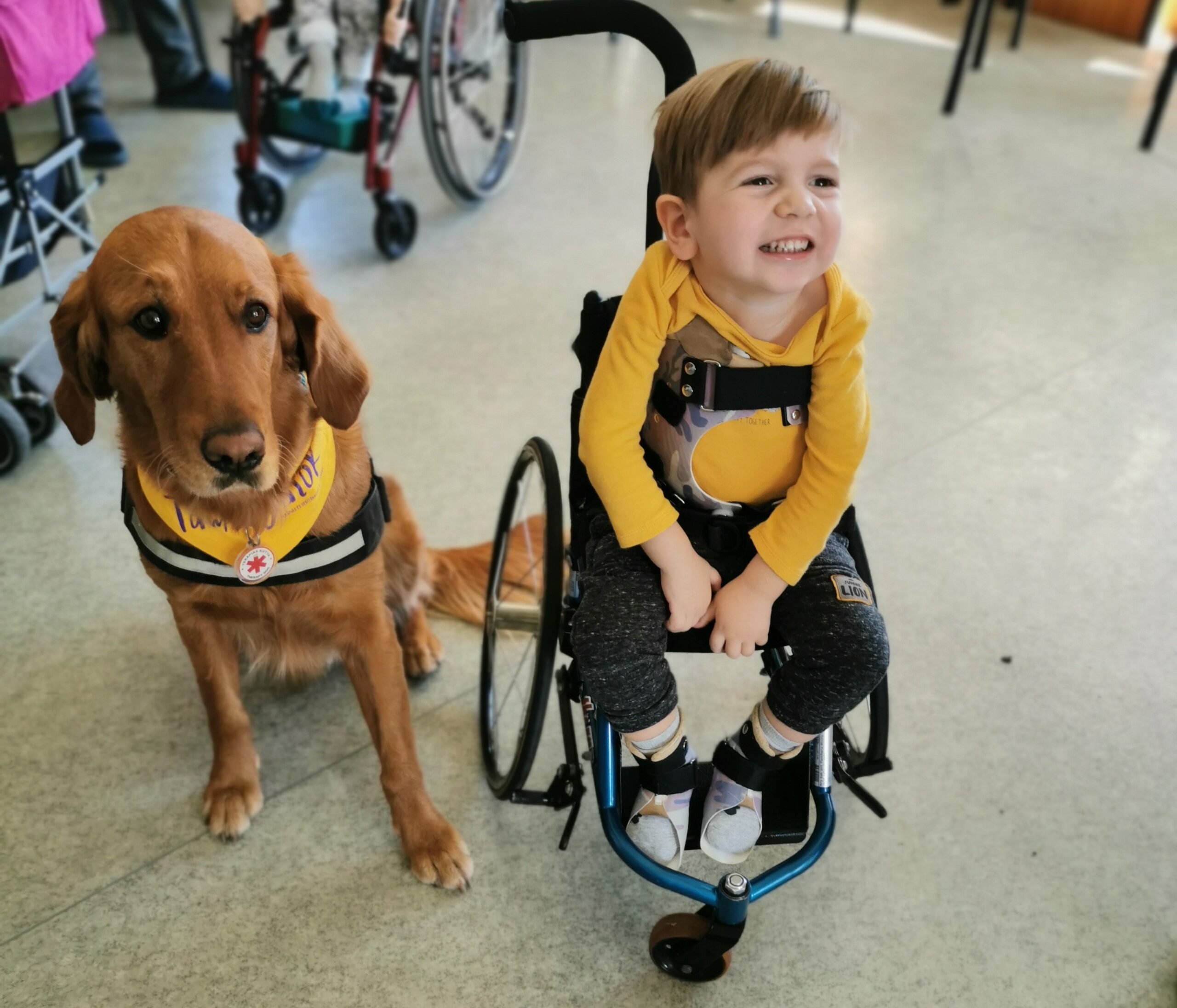Three years ago, a country learned the name of the rare genetic disease, SMA, and joined hands so that Zente (then a baby, now a four-and-a-half-year-old big boy!) could receive the most expensive medical treatment in the world. We talked with his mother about Zente’s development, motherhood, responsibility, and unusual everyday life.
I think the whole country is interested in how you are doing now?
Right now, on October 29, it will be the third anniversary of Zente receiving this horribly expensive but fantastic treatment, which fully fulfilled its expectations. The progress is enormous, and it is still going on. He works a lot on this, and we work a lot with him. Obviously, his everyday life is not like another four-and-a-half-year-old’s, but it has basically become natural for him. And he wants progress so much, which can be seen in his movement development. So we are fine.
And how are you? As a mother, how did you experience and how are you experiencing this process?
Uh, that’s a tough question. When your child is born, you have an idea, you have desires, and when it turns out that this is the matter with them, every parent is distraught. To this day, I can still see the huge difference compared to other children. Some situations are not comfortable for me, but they absolutely are for Zente. I have to keep learning this. There are days when the glass is half full, and there are days when the glass is half empty. For example, when we are in a hospital environment, where I see children with other diseases, even in serious conditions, I feel we are lucky with SMA. It is already treatable, and Zente is smart and has no pain. Then we go to a playground where everyone is super active, and it feels a little bad. Of course, I don’t show this to Zente, and I tend not to worry much about it. I don’t need much to be happy. As I see that he can, for example, climb the ladder and stop there and do the task he set out to do, I think the problems are dwarfed. I’m like, we’ll work on it, and we’ll be fine. He’ll be fine too.
On your Facebook page, you shared a video of Zente helping in the garden and picking fruit on the ladder. 169 thousand people follow you, which is a huge number!
At first, I only wrote this little page for family and friends. Since I couldn’t find any information about this disease either, I thought that this way, anyone who needs details can reach out to us. Back then, I wrote posts with a completely different tone. I was much more daring to express my opinion about certain things, but now I think it through ten times. Thirty thousand reactions will be received in half an hour if I post a picture or two sentences. But there is also a downside to this. Zente is a first and only child. It is hard enough to learn how to raise a child in the first place to pass a healthy set of values onto them. In the meantime, he is limited in his mobility, which also needs to be included in his life. And then there’s the third factor, that he’s very popular. He can’t really understand this yet, but he is recognized on the street and has to be taught how to handle it well, even though it’s not easy for us parents.
Thanks to you, this disease received so much attention, and the treatment became funded by the state.
When we started this three years ago, not even the medical community had really heard of this treatment, and now, thank God, several children have received it, funded by the state. Of course, there are still concerns and questions, and unfortunately, there are always people who cannot receive financial support from the state, so they continue to collect money. This mass of people who follow our page has already helped others many times.
By the way, newborn screening for this disease is starting now. Zente will also be involved in this campaign to deliver this message to many people. Unfortunately, this disease cannot be eradicated entirely, and there are at least 15 new children every year, so it is good that future parents know about the screening opportunity.

I have the feeling that your story somehow restored people’s faith in humanity.
Yes, it’s chilling. Many people come to Zente’s page when they are having a really bad day. Maybe that’s why there are now 8,000 more followers on the page because people are so frustrated in everyday life that they need something to draw strength from. Many people write that it was the best investment of their life. Three years ago, they spent 700 HUF on this, and now they can pat themselves on the back that they made the right decision. It was a big joint project, and they are curious.
And so everyone can monitor that Zente is moving better and more skillfully every day. You don’t even use a wheelchair anymore?
He prefers to move around in our home with a walker or on all fours, sometimes sliding on his booty. The local facilities do not allow him to use a wheelchair in the kindergarten because it is not a barrier-free institution. There they either help him, or he comes and goes with a small toddler motorbike. Basically, he doesn’t sit in a wheelchair much, only when, for example, we go on a long trip or walk around town. It is easier for everyone, and the freedom of movement remains since he rolls wherever he wants or wherever we let him. Many people do not like to put their child in a wheelchair, but it is a beautiful sight to me. He got it when he was 10 months old; he was able to start it right away and was so happy!
He does not classify himself as a wheelchair user. He says, „Mommy, I can walk” and he’s practically right because he can actually walk, just not all day. Thank God he hasn’t yet developed a disease perspective. Some people prefer to start denying their illness because they think that way they control it mentally, but I disagree with that. I’m not going to say, „You don’t have any disability at all, kiddo,” because I think he should acknowledge that on some level, but I’m glad he’s not bitter about the situation.
What are your experiences with accessibility?
You don’t even have to have an illness; You can’t get anywhere in the world even with a stroller in Hungary.
We live near Pécs and often go to the hospital in Budapest. When we manage not to stay at the hospital overnight, we need accommodation. It is a disaster that often what is marked as barrier-free is not barrier-free in any way. The fact that you can go up with an elevator does not make an apartment barrier-free if it’s not thought through how to get to the elevator. Or there are the level differences within the apartment, the vast doorsteps, and the sizeable rimmed shower trays. There are a thousand pitfalls. People in wheelchairs need maximum creativity. For example, we have made a ramp out of wood more than once or twice. Even this summer, when we arrived in Italy, we immediately saw that we had to drill and carve; otherwise, we wouldn’t be able to get into the apartment.
The idea of Access4you is also due to such a story. Our founder, Balázs Berecz, expressed the need for a common language about accessibility in front of the stairs(!) of an accessible accommodation in Lisbon.
That’s a really cool thing you guys came up with. I am not the target audience yet, because my child is only 13 kilos, and I can pick him up anytime. However, when we go somewhere with Zente’s godmother, who also has SMA, it is a struggle. Lifting a 100-kilogram electric wheelchair and an adult woman is by no means so easy; unfortunately, it is often necessary.
Original interview: Andrea Szilágyi
Translation: Dalma Ecseri
Source of photos: Krisztina Tóth
Access4you is a social impact startup: we survey and evaluate buildings to provide detailed, credible information about the built environment for the special needs community. Based on the results, we issue a certificate stating that the location is entitled to use the ‘Access4you’ European certification mark, and the detailed data of the site will be publicly available in the access4you.io database and mobile application.
For more information: https://access4you.io/b2b
